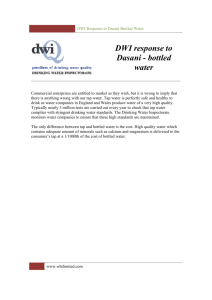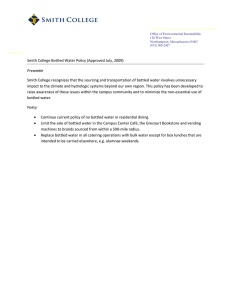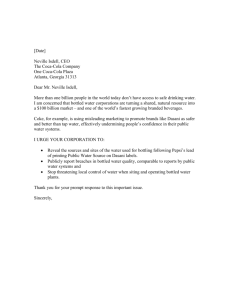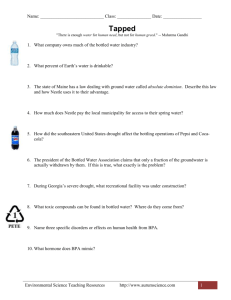Dickinson Senate: resolution supporting water bottle ban
advertisement
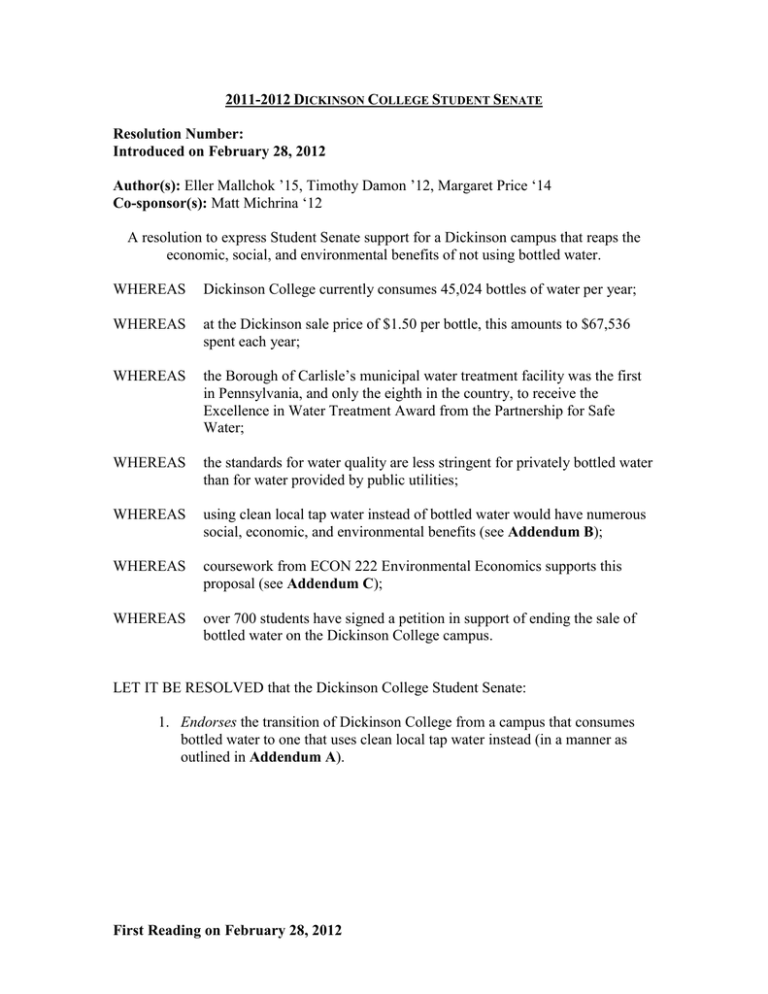
2011-2012 DICKINSON COLLEGE STUDENT SENATE Resolution Number: Introduced on February 28, 2012 Author(s): Eller Mallchok ’15, Timothy Damon ’12, Margaret Price ‘14 Co-sponsor(s): Matt Michrina ‘12 A resolution to express Student Senate support for a Dickinson campus that reaps the economic, social, and environmental benefits of not using bottled water. WHEREAS Dickinson College currently consumes 45,024 bottles of water per year; WHEREAS at the Dickinson sale price of $1.50 per bottle, this amounts to $67,536 spent each year; WHEREAS the Borough of Carlisle’s municipal water treatment facility was the first in Pennsylvania, and only the eighth in the country, to receive the Excellence in Water Treatment Award from the Partnership for Safe Water; WHEREAS the standards for water quality are less stringent for privately bottled water than for water provided by public utilities; WHEREAS using clean local tap water instead of bottled water would have numerous social, economic, and environmental benefits (see Addendum B); WHEREAS coursework from ECON 222 Environmental Economics supports this proposal (see Addendum C); WHEREAS over 700 students have signed a petition in support of ending the sale of bottled water on the Dickinson College campus. LET IT BE RESOLVED that the Dickinson College Student Senate: 1. Endorses the transition of Dickinson College from a campus that consumes bottled water to one that uses clean local tap water instead (in a manner as outlined in Addendum A). First Reading on February 28, 2012 Addendum A Clarification: The purpose of this resolution is for the Student Senate to endorse the broad vision of the College transitioning from bottled water entirely to clean local tap water – this is EarthNow’s long term goal. This transition, however, must occur in stages. It must also involve both material and cultural changes (as distinct types of changes). The very first step was a cultural one: EarthNow ran a multi-semester education campaign on campus to promote tap water instead of bottled water – this effort collected more than 700 student signatures in support of making the transition. The culmination of this growing awareness and support is for the Student Senate to formally endorse this transition effort, thereby making further progress possible. One such next step is a material one: that Dining Services will begin to allow its purchasing contracts for bottled water to expire. This means that the College’s dining venues will no longer sell bottled water once this is implemented. Additional material steps could include adding infrastructure (e.g., filtered filling stations) to existing buildings and future renovations/construction (e.g., the new residence hall, the Kline and HUB projects, etc). These would be material changes that would promote further cultural changes. In fact, details for adding any needed infrastructure could be conducted during the remainder of this semester; any necessary installations could be made before the sale of bottled water would end. Ultimately, this transition will be mostly a cultural one. Students will still have access to bottled water from outside the campus and can still choose to drink it. The goal is not to eliminate all bottled water consumption, but to make Dickinson a place that promotes and facilitates a way of living without it. The Senate’s Environmental Liaison will continue to work with EarthNow as the process moves forward, ensuring appropriate collaboration and representation. Addendum B The benefits of switching to clean local tap water over bottled water from afar: Social Benefits: Higher health standards Water is available to students at significantly lower cost (more equitable) Shows support for the Carlisle community Economic Benefits: The College saves money that can go to other things students want Students themselves save money and can spend it on other things Greatly improves resource efficiency Environmental Benefits: The College will produce less waste Less pollution from manufacturing and trucking bottled water Promotes utilization of local resources and clean water sources Other College-Specific Benefits: Boosts Dickinson’s reputation for sustainability (good for Admissions, everyone) A step toward commitment of becoming “carbon neutral” Etc. Addendum C Take Back the Tap: Improving Dickinson’s Economic, Social, and Environmental Sustainability A Proposal by Timothy Damon ‘12 ECON 222: Environmental Economics Professor Sebastian Berger February 23, 2012 Goal: To transition Dickinson from a campus that consumes bottled water to one that uses clean local tap water instead, thereby providing a range of economic, social, and environmental benefits for the College. Rationale: This project has its roots in principles from ecological economics perspective. All human activity transforms natural resources into waste products to provide economic goods and services. Since natural resources are limited by quantity and rate of availability, the human economy must consider the optimal scale for its activity, while seeking to do so as equitably and efficiently as possible (in that order). The case of bottled water: Bottled water requires the use of plastic made from nonrenewable oil stocks. Oil is essentially solar energy that was trapped (through photosynthesis) as organic matter millions of years ago, thus its use has allowed human activity to consume energy at a much faster rate than what the sun provides annually. Consequently, making bottled water not only depletes an irreplaceable resource but is also one of countless examples of humans living beyond their natural means (a lifestyle that is rapidly burning through all the savings in our solar bank account). Studies have also found that bottled water is not free from contamination (as many believe) and its quality standards are actually less strict than those that regulate public water utility. The case of Dickinson: Dickinson consumes over 45,000 bottles of water each year. In addition to the bottles themselves, this activity consumes resources for shipping (more oil) and generates pollution during both production and disposal – even recycling bottles consumes more energy, which mostly comes from fossil fuel sources. Spending money for bottled water is absurd when one considers that the College has locally available water of nationally-recognized quality right here in Carlisle. The benefits: Switching to clean local tap water will, inter alia, save money (for both the College and students), reduce Dickinson’s environmental impact, conserve natural resources, promote the local community, improve water quality, and boost the College’s reputation for sustainability. Conclusion: This project is entirely a matter of policy. While there are complementary improvements that could be made to the physical infrastructure of the campus, taking back the tap is primarily about awakening to the reality of the implications associated with where we get our water. The clear choice is to move in the direction of greater economic, social, and environmental sustainability. (See graphics below) Compare, if you will, the Bottled Water System Dickinson currently has with the Tap Water System it could have. Which would you prefer?
